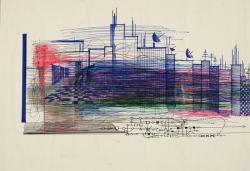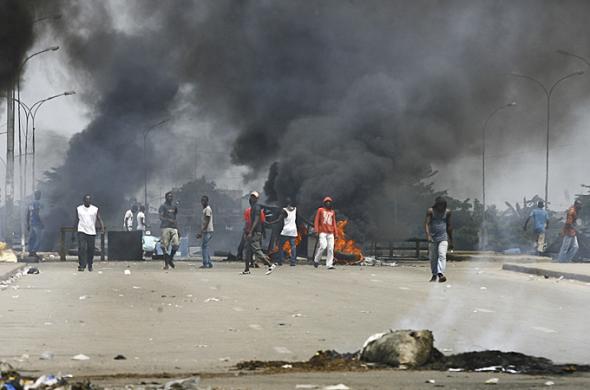York University, Toronto, Canada
5-7 May, 2011
Plenary speakers:
Achille MBEMBE, Wiser Institute for Social and Economic Research, University of the Witwatersrand, Exiting from the Long Night? Cultural Forms and Institutions in Africa- Sortir de la grande nuit? Formes culturelles et institutions en Afrique ;
Imed MELLITI, Institut Supérieur des Sciences Humaines, University of Tunis el-Manar: Jeunesses maghrébines : religiosité, enjeux identitaires et enjeux de reconnaissance- Maghrebine Youth: Religiosity, Identity and Recognition ;
Donald SIMPSON, Innovation Expedition, Africa - Here and There in the Sixties: A Canadian Perspective. Afrique Ici et ailleurs dans les années 1960: Une perspective canadienne.
Official Conference Opening / Ouverture officielle de la conférence
Dr. Mamdouh SHOUKRI, President and Vice-Chancellor of York University/ Recteur et Vice-chancelier de l’Université York.
The Canadian Association of African Studies (CAAS) extends a special invitation to scholars and professionals working on all aspects of African Studies for its next annual conference. The conference, to be held on May 5-7, 2011, at York University - Université York, Toronto, Canada, will be hosted by the Harriet Tubman Institute for Research on the Global Migrations of African Peoples, York University, with the support of various internal and external sponsors. Our aim is to attract an international group of specialists at all stages in their careers to facilitate discussion and dialogue, in both of Canada’s official languages, across disciplines and between scholars and professionals based in both the North and South.
In recognition of 2011 having been proclaimed by the United Nations General Assembly as the International Year for People of African Descent, the central theme of the 2011 annual conference of the Canadian Association of African Studies (CAAS) is Africa Here; Africa There. Africans have long peopled the African continent, as well as other landscapes through external migrations. During the modern era, the movement of African peoples has taken place under three major contexts: various trades in human beings, economic hardship emanating from natural and non-natural factors, and political, ethnic, religious and other types of persecution.
Whether internal or external, the displacement of African peoples has always led to greater complexities within the host societies. Africans and people of African descent, free, freed or enslaved, made up a sizeable proportion of the population of Évora and Lisbon during the late 1400s and early 1500s and performed much of the most menial manual work while speaking various West and West-Central African languages and supplying characters and speech patterns to the works of contemporaneous playwrights like Gil Vicente. The same was true of London, not to mention other places in the United Kingdom, from at least the time of Shakespeare to the early 19th century. By the mid-1800s, their presence and influence was even more pervasive in Brazil, as well as Cuba. Similarly if Africans and the descendants of Africans attempted to recreate their homelands, imagined or not, amongst host societies, as was the case of the marooned Zanj in Iraq (869-883 A.D.), the great Bantu state of Palmares in XVIIth century Brazil, or later the Igbo in Maryland and Virginia, Jamaica, and Barbados, the process today is no less omnipresent as exemplified by the existence of Little Angola in Rio de Janeiro, Little Nigeria in Houston, or the current attempt to establish a Little Ethiopia in Toronto.
In other words, Africa has long existed within the old continent and beyond as well. This reality, far from signifying solely an African presence, points to a series of new ways of moving across and exploiting space stemming from an evolving division of world labor, distribution of resources, and production of modes of living together. Africa Here; Africa There will explore, in English and in French, the multifaceted complexities generated by these phenomena within and outside of Africa over time from the perspective of various disciplines.
The Canadian Association of African Studies (CAAS) contributes expertise, research, and informed debate concerning a wide range of African “matter” related to sociocultural issues, the arts, political economy, the environment and transnationalism, among others. Since 1970,CAAS has demonstrated how African issues matter to a wider range of Canadian and international publics in academic, policy-making, programming, and many other circles. The expanding recognition of African contexts and initiatives to a growing range of transnational practices (from humanitarianism to peace building; markets to social movements; climate change to food security; religious dynamism to health and education policies; sports to music, theatre and cinema; truth and reconciliation processes, migration and diasporas to the forging of the world) has meant the continent is taking on a greater prominence in the attention, imagination, and actions of more and more publics. We also encourage the submission, whether in English or in French, of research papers in these and other areas.
In the last forty years, like many other Northern nations, Canada has had expanding and diverse relations with Africa.
African immigration to Canada has increased not only through the regular immigration of professionals and others, but also, importantly, through refugees fleeing from conflicts in areas such as Uganda (1972), Somalia (since 1991), and Algeria (since 1992). In turn, a growing number of Canadians have been to Africa through an expansion of humanitarian and international development activities by Canadian governmental and non-governmental organizations, business activities, particularly in natural resources sectors, university exchanges, and tourism. Solidarity work by Canadian individuals and groups also increased during this period, from working with national liberation groups to supporting human rights agendas, from advocating for women rights to addressing health and environmental conditions.
Canadian governments have been preoccupied with African matters through international bodies such the Commonwealth, la Francophonie, the United Nations, and G-8 summits playing a visible part during the anti-apartheid struggle, peacekeeping and peace building activities, and supporting NEPAD (New Partnership for Africa’s Development), to name but a few.
The growing number of Canadians of African birth and descent have not only played important roles in such exchanges and ties but also helped to introduce or expand new consumption patterns and artistic practices in Canada(in food, clothes, music, film, literature, and the like) and new forms of religiosity and congregations. At the same time, there have been some tensions emerging in Canada-African relations such as: the tightening of visas on African visitors coming to Canada in the name of security and to limit refugee claims; a reduction in the number of Canadian peacekeepers in Africa; a recent reduction in number of African priority countries for CIDA; protests over labor practices and engagement against corrupt practices; and, limited African beneficiaries of Canadian direct foreign investment in Africa.
The above issues help to highlight key concerns and demonstrate why there is growing interest in Africa in Canada. However, there is a vast array of topics of interest in African Studies beyond these issues, as well, that would be welcomed to be presented at this conference. From examining wide-reaching events such as the slave-trades, the HIV/AIDS pandemic, and current conflicts to the minutia of everyday life such as schooling practices, religious invocations, and media consumption, Africa Here; Africa There will provide an opportunity for the sharing of research and debate concerning the study of these issues in both English and French.
CAAS, including its Canadian Journal of African Studies, have historically embodied extensive coverage of the continent and, in that spirit of attending to all African
matters, this conference welcomes papers on a wide range of topics concerning Africa and African peoples abroad from a variety of disciplinary and interdisciplinary approaches. In keeping with the bilingual nature of CAAS and the encouragement of bilingual study at York University, paper and panel proposals in French are particularly welcomed.
Africa Here; Africa There aims to continue the CAAS tradition that exemplifies why Africa matters to various publics in Canada and beyond. This Call for Papers intends to provide a forum for addressing and presenting academic research and policy proposals that examine the histories, debates, policy issues, and current practices related to African matters.
The deadline for submitting paper, as well as panel, proposals has been extended to February 21, 2011. For information on submitting paper and panel abstracts, conference registration payment (on-line or by cheque), requests for funding for graduate students in Canada, and
accommodation possibilities please go to http://www.arts.ualberta.ca/~caas/en/2011conference.html



